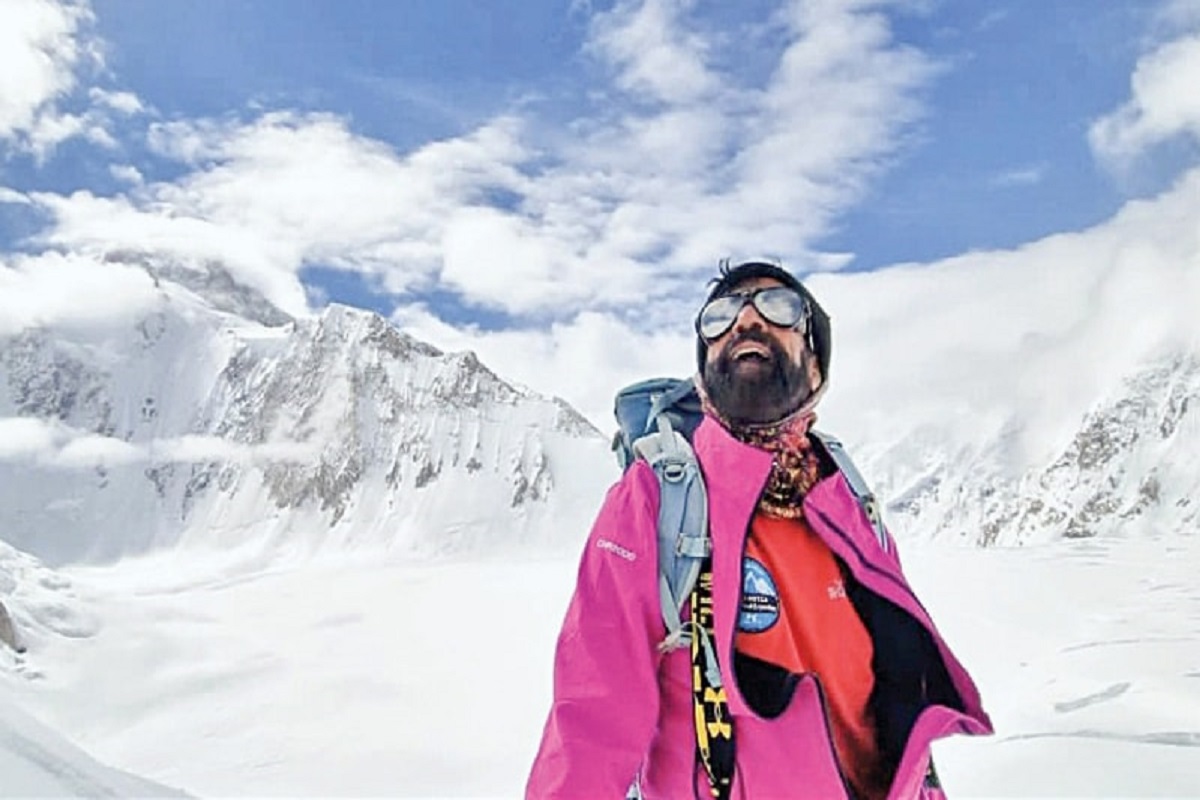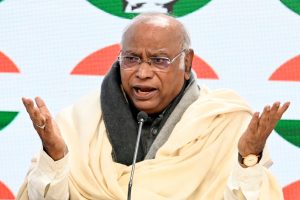On May 17, ace mountaineer Ali Raza Sadpara suffered a debilitating injury after falling from a cliff during a training climb for K2. He severed his spinal cord and fractured several ribs. He was in a coma for a few days before passing away on May 27.
I had met him only a few days before. Here is how I remember meeting the legend himself.
Travelling towards an area which houses the largest mountain ranges in the world, you can only hope to meet those who are not afraid to scale them. It is early May, and my hope, the secret wish in my heart, is fulfilled. We are just outside Skardu, in the Ghanche District of Gilgit-Baltistan when we bump into Ali Raza Sadpara at a roadside restaurant serving biryani, or their version of it — plain rice with a very soupy beef curry. Looking at Ali Raza’s somewhat short, slender physique it’s hard to imagine that this unassuming man is one of the top mountaineers of Pakistan.
His eyes crinkle when he smiles and his face tells a thousand stories — it’s aged far beyond his 56 years because of the decades spent under the glare of the sun reflected on the snow. He’s excited about the upcoming mountaineering season which is due to start very soon. When I take my camera out, he appears somewhat shy and avoids looking at it.
“Last year I gave very strict instructions that if anyone returns from the mountains without a summit …” he says to our guide, who he’s familiar with. “It just won’t be good.” He’s referring to how Pakistani High-Altitude Porters (HAP), much like Nepali porters or Sherpas, do the bulk of the work ‘preparing’ mountains for their foreign clientele. They often fix the ropes, carry the gear and set up high camps, only to be denied a summit attempt themselves after personally bringing their clients nearly to the top. It hurts to be so close to, with a summit glory within reach, and then be told to stay back.
It’s one of the greatest injustices that porters and Pakistani guides have been subjected to for decades and Ali Raza is not having any of it, anymore. As one of the senior-most active mountaineers in Pakistan, he’s got a lot of sway within the local mountaineering community.
Most other young mountaineers I meet call him their ustaad [teacher]. He’s been conducting mountaineering workshops regularly, trying to pass on essential skills to the younger generation. Ali Raza believes that those lack of skills, and the very few opportunities to develop them, is what keep Pakistani guides and porters a step behind the Nepali ones, even though they are just as strong and perhaps, due to their familiarity with the local mountains, better equipped to guide mountaineers.
UNTIL NEXT TIME
The next time I meet him, only a few days before his fateful accident, Ali Raza is chiding me for not giving him the opportunity to host us at his place. Next time, I promise.
“I started climbing in 1986,” he tells me. “I attempted to climb K2 the same year. I didn’t know anything at the time, [like] what was the proper way of wearing boots or crampons.”
A local hero and a pioneer HAP from Chunda Valley, Mohammed Ali Chunda, widely regarded as the first person to summit an 8,000m mountain from Baltistan, showed Ali Raza the ropes — quite literally. “He taught me how to clip on the safety belt, fix the ropes, how to properly wear boots and crampons,” Ali Raza tells me.
He took to mountaineering as a fish takes to water. In his very first attempt, he made it up to an altitude of about 8,000m. “At that time, Pakistanis were not allowed to go to the summit,” he says, his otherwise smiling face suddenly gets very serious. “I was with a Korean group and I put a lot of pressure on them to let us go to the summit,” he continues. “They said to me, ‘We brought you up to this point. If the Pakistan government finds out then it will be a problem for us. You’re not allowed to go above C2.’ That’s why I couldn’t summit.”
Was there really a restriction in place preventing Pakistanis from summiting? “Who knows!” he says, adding that at the time some foreign mountaineering groups didn’t want to share the glory of the summit. They paid for this, not the HAPs. Not one to dwell on the negative, Ali Raza breaks into a smile and continues his mountaineering story. “The second mountain I went to was Broad Peak and summited it,” he says, beaming with pride. “And since then, by the grace of Allah, I have climbed four of our 8,000m peaks over 17 times.”
Those four mountains are Broad Peak, Nanga Parbat, Gasherbrum I and Gasherbrum II. That’s four of the five 8,000m mountains in Pakistan. The only mountain Ali Raza hasn’t been able to climb is the one that’s eluded him from his very first climb — K2.
He almost made it to the summit in 2009. “I went up to 8,400m,” he relates. K2 is 8,611m high, the summit is only 211m away, just within reach. “At that expedition, a German foreigner slipped and died,” relates Ali Raza. Once that happened, his client who was at Camp 4, the last camp before the summit push, forbid him from going to the summit. “Otherwise I’d have summited,” the frustration is audible in Ali Raza’s voice.
“I tried to summit K2 three times and failed,” he says. “Inshallah this year, I plan to go with Naila Kiani, so this is the year Inshallah. It’s my last wish!” he laughingly declares.
His “last wish” is never granted. A few days after this conversation Ali Raza would be no more. One struggles to think of him in the past tense. His friends, family, students, and admirers still feel his presence.
LAST ATTEMPT
The mountaineering community has lost a mentor and a friend by losing Ali Raza. Legendary Pakistani mountaineer, Mohammed Ali Sadpara, who passed away last year, was among Ali Raza’s students.
One of his long-standing climbing partners, friends and former students, Sirbaz Khan, was climbing Makalu in Nepal at the time of Ali Raza’s death. His expedition crew decided to withhold the news of Ali Raza’s death until Sirbaz was safely back at base camp.
“I got down from the mountain all happy and pleased only to find out that one of my dearest mountaineering friends has left this world,” he wrote on Instagram.
“He was my ustaad, my friend, my partner. This summit is dedicated to my favourite laughter in the world which I’ll never hear again. Ali Raza, my friend, thank you for teaching me how to climb and even more importantly for teaching me how to live…” he added.
Naila Kiani, the first female mountaineer from Pakistan to summit Gasherbrum II, could barely speak from grief. Ali Raza was her climbing partner on that expedition and he was a great source of support and encouragement.
She recalls that there were a lot of Pakistani crews with different teams stationed at base camp for Gasherbrum I and II. “He was the oldest,” she says, “I’m not joking but he and Sirbaz were the fastest. They would carry a lot of weight and would run forward. [While] Sirbaz is still young, Chacha [how Naila refers to Ali Sadpara] was twice his age and yet he would be right in front.”
“Whenever Pakistani climbers would fall back or appear unmotivated, he would encourage them and guide them,” she adds. “He was an incredibly humble man and he would always be teaching others. “Lastly, the thing I loved about him was that he was always good humoured. There was always a smile on his face. During some of our hardest moments on the mountain, he would crack a joke and we’d all end up laughing. Foreign climbers would look at us as if we’re crazy. But these were the qualities that made him unique.”
For Sirbaz, the last couple of years have been especially bittersweet. While he’s gone on to newer heights and broken records on some of the highest mountains in the world, he’s also experienced devastating losses. He’s lost both of his closest friends and mentors one year after the other — Ali Sadpara on K2 in 2021 and Ali Raza Sadpara while training for K2 this year.
“The life of a mountaineer has huge rewards and huge losses,” he states. “If you don’t die soon, you see a lot of your friends leave you.”
He’s teamed up with Naila Kiani and they will climb K2 together. They’ve dedicated their expedition to Ali Raza Sadpara. The one mountain that never called to Ali Raza Sadpara is the one they will climb in his memory.










